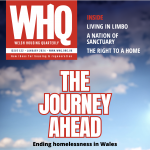In October the white paper set out the Welsh Government’s plans to make homelessness rare, brief and unrepeated. But its proposals for ending homelessness in Wales are out for consultation at a time when thousands of people are struggling to find a home and housing providers and local authorities are under severe financial pressure.
 The Winter issue of WHQ reflects on the journey ahead to ending homelessness with contributions from many of those who have contributed to the new policy framework. Suzanne Fitzpatrick, chair of the Expert Review Panel whose recommendations fed into the white paper, says it is imperative that current constraints do not hold back our future ambitions. Matt Downie, chair of the Ending Homelessness National Advisory Board, reflects on an extremely difficult year just gone and the work that lies ahead. And Clare Budden, chair of the board’s task and finish group on the workforce, says more must be done to address the challenges in delivering effective services.
The Winter issue of WHQ reflects on the journey ahead to ending homelessness with contributions from many of those who have contributed to the new policy framework. Suzanne Fitzpatrick, chair of the Expert Review Panel whose recommendations fed into the white paper, says it is imperative that current constraints do not hold back our future ambitions. Matt Downie, chair of the Ending Homelessness National Advisory Board, reflects on an extremely difficult year just gone and the work that lies ahead. And Clare Budden, chair of the board’s task and finish group on the workforce, says more must be done to address the challenges in delivering effective services.
The financial pressures and competing priorities facing local councils come over loud and clear in our interview with Cllr Andrea Lewis, deputy leader of Swansea Council and housing spokesperson for the Welsh Local Government Association. She argues that the changes will take time and pleads for more flexibility to deliver more homes. The quickest way to do that, argues Duncan Forbes, is to bring empty homes back into use – without them, legislation on homelessness will miss the target.
We also reflect on good practice around the country, with articles from Chantelle Davies on the first Housing First for Women project in Wales, Bill Rowlands on new research on neurodivergent young people and homelessness, Hannah McGillivray on Housing First for Youth and Kath Griffiths on applying a co-operative model to youth homelessness.
Elsewhere in this issue, Owain Meirion reflects on the options for radical long-term reforms that emerged at Cymdeithas yr Iaith’s conference on the housing crisis and the Right to Adequate Housing. Meanwhile, Gary Newman looks at housing and the climate crisis and the potential for trees and timber construction to boost the environment and the economy.
We also have two articles on different aspects of the housing situation facing refugees and asylum seekers. Gareth Lynn Montes makes the case for better support for people with No Recourse to Public Funds while Joy Kent presents some initial findings from her research into what the housing sector can do to support people seeking sanctuary in Wales.
We hope that all that, plus all our regular features including a new update on what’s happening in regulation, make for a valuable read to kick off 2024.
The new issue of WHQ is available to subscribers here in a choice of formats: online or as a fully designed PDF or digital edition for your computer or phone. A limited selection of articles are free to read but for full access or to find out more about subscribing go here.